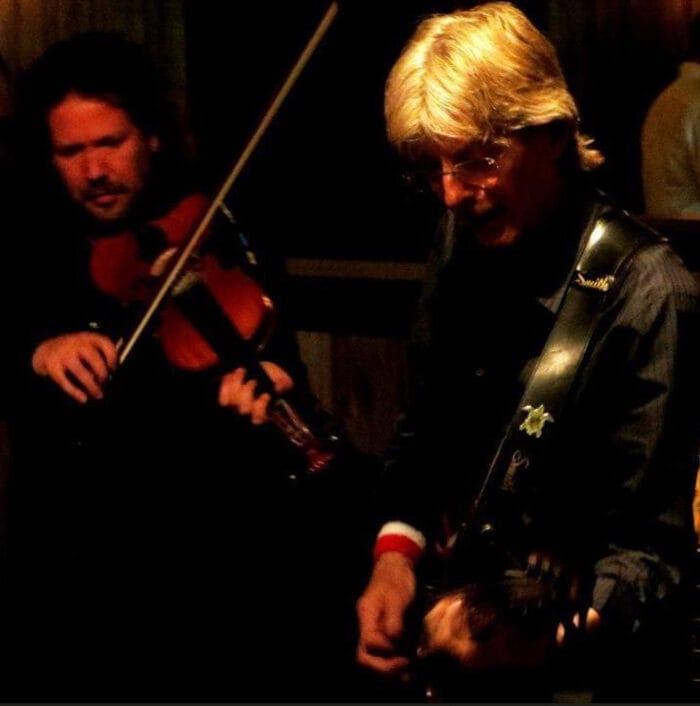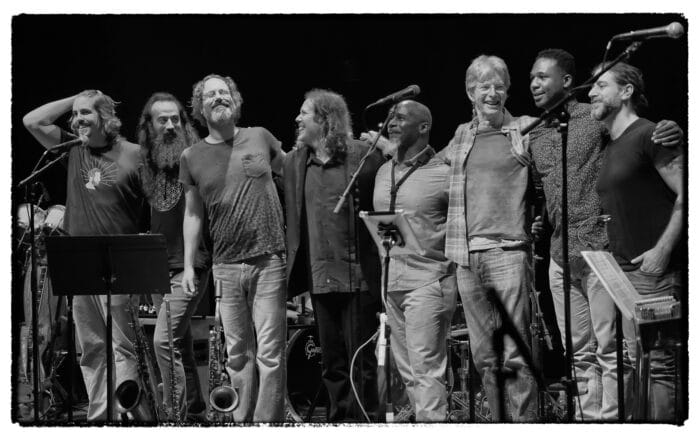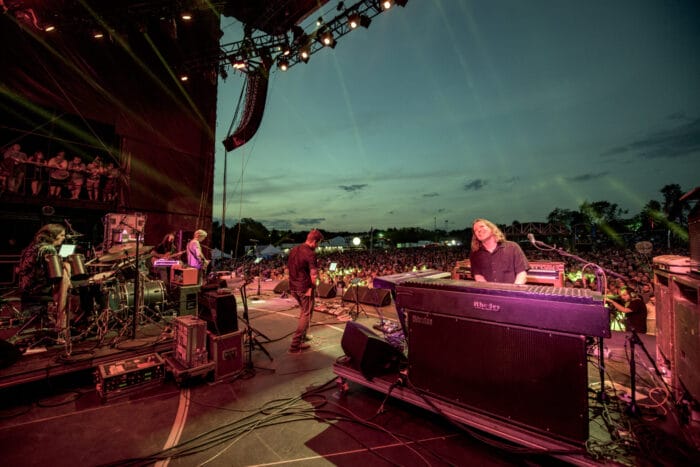The Wheel and The Orb: Jason Crosby on Phil Lesh

photo: Jay Blakesberg
***
Jason Crosby’s fandom began before he started high school. “Somewhere in the late ‘80s, I heard about the Grateful Dead from my older brother, Brett. He would travel around the country, tape shows and come home with these cassettes that I would then borrow or dub onto another tape.”
Crosby’s experience was similar to many Deadheads of the decade, but that’s where the crossover ends. By the onset of the ‘90s, he was immersed in the jam scene, applying his perfect pitch and classical orchestra training to improvisational settings— accentuating groups like Wetlands Preserve stalwarts Solar Circus and God Street Wine.
After becoming a regular on the Big Apple scene and embarking on extensive tours with Susan Tedeschi and Robert Randolph, the lifelong New Yorker received a fateful offer that would result in a tenure in Phil & Friends and The Terrapin Family Band, where he learned to preserve the legacy of the Grateful Dead.
“I try not to use grateful so much, but it’s hard to find another word for how I feel about Phil.”
How did you come to play with Phil Lesh for the first time?
Matt Busch, who was managing God Street Wine, brought us on a Grateful Dead extravaganza out in Marin County.
It was the 20th anniversary of their major label debut album [$1.99 Romances]. Their mission was to do a live broadcast of this 20th-anniversary album, and Bob [Weir] would join them at the end for a couple of Dead tunes.
I wasn’t an original member of the band, but I was a latter-day member, friend and fan going back to my high-school days.
They asked me to join them as a sixth man to enhance this webcast because I could play violin and also join their keyboardist. I was really lucky. It was special to play with Bobby, both at TRI and Sweetwater. We then got invited to Terrapin, and this was before there was anything set up in the Grate Room. There was no stage in the bar, but people were playing on the floor where the stage would eventually go.
When we got there, there was only one keyboard available, so I couldn’t play the second keyboard. I played violin the whole time. According to Matt Busch, who was sitting on the stairs next to Phil and [God Street Wine manager] Michael Weiss, Phil turned to him and said, “Who’s that guy? And what is that that he’s playing? Is that a violin? Is that a viola?”
Matt was like, “Oh, that’s Jason Crosby.” He talked me up and told him about the bands I played with. “He plays with Jimmy [Herring] and Oteil [Burbridge]…” So Phil was like, “Well, I want to play.” And so he came out, and he played with us.
I distinctly remember when guitar solos were going around, and he looked at the band, then at me and wanted to hear this weird six-string violin I had. [Laughs.]
You had yet to relocate to the West Coast and lived in New York. When did the call come to sit in with Phil & Friends?
Wellmont, N.J., November 2012, was my first show with Phil & Friends.
I’ll never forget the first thing Phil said after hello: “Are you familiar with ‘The Wheel?’” And I made some silly joke, like, “Yeah, great invention.” He laughed, and that was the first song we did. I ended up doing a bunch of songs after it went well at soundcheck. Then, Jeff Chimenti had me surprise Phil by playing keyboards during the encore. It was a big night. When Phil learned that I played keys, I think he wanted to play together even more.
Then he hired God Street Wine to play a residency for a week with Phil & Friends at Terrapin. We were Phil’s band, and we also did our own thing. I just felt this momentum between me, Phil and the scene so I decided to stay in the Bay.
Terrapin Crossroads became a source of community for you after the move. There’s no doubt your frequent visits must have assisted you in scoring gigs, including a slot in the Terrapin Family Band.
I met so many great people there, including the younger generation, like Grahame and Brian [Lesh] and [Alex] Koford and Ross [James]. Some of them played music and also worked at the club. I just remember them talking about how Phil would hold Sunday School at Terrapin for the kids. I thought that it was wonderful that he did that.
From what I gathered, Phil would jam with the younger folks and show them what it was he did and what they should be doing—teaching them Dead tunes and prepping them for what eventually became the Terrapin Family Band. Prior to that, it was called Communion. And that was the beginnings of my new West Coast fam.
Terrapin was an epicenter for a musical-social scene for many people. And definitely, I was one of them. If I was playing TRI and doing a webcast, I would go to Terrapin afterward. No matter where I was going, a visit to Terrapin always seemed to be part of the equation.
And it was great. I missed Terrapin terribly when we still had Phil with us. And I think Phil did, too, and that’s why he built the Clubhouse. The audience was getting it, but it was via YouTube; it still had that vibe, though, where we could sit and talk and hang out. We could play if we wanted to or not play. That’s the freedom that we had at Terrapin. They would just film it and get it out to people later.
There seemed to be a conscious effort on Phil’s part to select the chosen players to carry on the Dead’s legacy. It is as if passing the music to the next generation became an ethos of Phil’s approach.
Absolutely. I remember him saying he wanted the Grateful Dead’s catalog to be like children’s stories, where they were physically passed down to the generations, not like in an email but more like, “Son, this is ‘Jack Straw,’ and here’s the story behind that song.” That’s a beautiful thing. And he did that personally. That’s really how he viewed the music and what he hoped for it, and it is happening!
You played with Phil in various settings as a Phil & Friends member. How would you describe his demeanor as a bandleader?
I just loved playing with him so much. It’s been said many times by many people how uniquely he played.
In the beginning, what [playing with him] made me think of was that there was this lock in space… And he was trying to unlock this locked thing that would release the aliens. [Laughs.] He’d play these series of notes or rhythms or patterns. Each one was like a combination to magically unlock this orb in space… That’s what it made me feel like cause it was like nothing I had ever experienced before as a musician playing with a bassist. It was completely unique to what he did, and it is essential to that Grateful Dead’s sound.
As time goes on, what are some songs that will remind you of your time performing with Phil?
One that comes to mind is “Unbroken Chain.” I loved playing that with him. I loved playing “Help”> “Slip.” “Terrapin,” obviously. And “Crazy Fingers” and stuff like that had lots of changes. As a keyboard player, I like to have as many chords as possible to weave in and out of.
I played with Stu Allen after Phil passed, and we opened with “Unbroken Chain. There were a bunch of Terrapin people there in the audience and on stage, and we all went down a row and each did a line of “Unbroken Chain.” We sang it down the stage and it was really emotional. Then, we went on to play a recreation show that Stu had chosen. After “Unbroken Chain,” I was like, “OK, well, maybe I won’t be fighting back tears this whole day.” And then we played “Peggy-O,” and I could just hear Phil’s voice singing it in my head. It just went on and on, even if it wasn’t a song he sang; his spirit was so interwoven with the Grateful Dead. It’s heavy playing his music now, but it’s necessary and beautiful.
I’m just really going to miss him, and that freedom and spontaneity that he led with. It will happen in other groups, but it won’t be the same without him.
***

I could tell he wanted to hear what my violin sounded like in a solo setting and how I could improvise. It was exciting for me because I knew he was checkin’ me out—and all of us in God Street Wine. It was such a huge moment. I saw God Street Wine and the Grateful Dead when I was in high school. They were two of my favorite bands outside of classical music, and here I was 20 years later, with them all. And one band was the reason I was meeting the other. (Photo: Matt Busch)



This reminds me of the good times with Neal. We were pretty cheery about playing this show with Phil. These shows were really special because they reunited me, Rob and Neal together with Phil. (Photo: Jay Blakesberg)

This was right outside of Terrapin. They parked the van right outside. I just like Phil’s look in this photo; he’s just fucking rocking. (Photo: Jason Crosby)

Link to the source article – https://relix.com/articles/detail/the-orb-and-the-wheel-jason-crosby-on-phil-lesh/
Recommended for you
-
Sale!
Roland Crash Cymbal (CY-8)
$115,00 Buy From Amazon -
48 Pieces Drum Dampeners Gel Pads Silicone Drum Silencers Soft Drum Dampening Gel Pads 4 Colors Drum Mute Pads for Drums Tone Control
$9,99 Buy From Amazon -
Korg nanoKONTROL2 Slim-Line USB Control Surface, Black
$76,00 Buy From Amazon -
Trumpet Brass Cavalry, Cavalry Trumpet Marching Bugle Horn Gold Plated Bugle Horn Professional Brass Cavalry Trumpet Instrument for Students Kids Beginner Military Orchestra
$0,00 Buy From Amazon -
Behringer ABACUS Analog Music Computer Module for Eurorack
$121,90 Buy From Amazon -
Remo BJ1100M3 Clear Diplomat Banjo Head (11-Inch) – Medium Collar
$39,99 Buy From Amazon -
VANPHY Soprano Ukulele for Kids 21 Inch Ukelele with Bag Strap Picks Songbook Cleaning Cloth Suitable for Adults and Beginnersï¼Light Pinkï¼
$38,99 Buy From Amazon -
AODSK Single-X Keyboard Stand Adjustable Width & Height,Piano Stand with Locking Straps & Quick Release Mechanism-Adjust height in one second
$40,99 Buy From Amazon













Responses